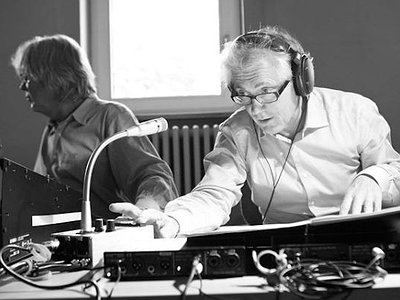Recording can be related to a particular location, but thanks to technology, it no longer has to be. How do you see the relation between sound, location and space?
If the music does not fit the recording location it is very, very hard work for the musicians to make a good performance. They cannot hear themselves the way they need to. We can change the sound a lot after it is recorded but this is always an emergency solution. The right hall for the type of music is the single most important factor to a successful recording.
In how far are the objective, universal and measurable parameters for what constitutes quality in a recording?
There are none. If enough people say it is a good recording then it probably is, even if a professional engineer or producer might have a load to criticise. Fürtwängler's Beethoven Ninth from Bayreuth is one of the greatest recordings of all time – the ear adapts to the rawness of the sound and strange balance quickly and the performance is electrifying.
What are currently your main challenges and ambitions in terms of your approach to production?
The next recording is always a challenge and the one I am editing too.
Tell us about your studio, please. What were criteria when setting it up and how does this environment influence the creative process? How important, relatively speaking. are factors like mood, ergonomics, haptics and technology for you?
I only have an editing studio, at home. It is quite comfortable with a lot of natural light. The equipment is good but not exceptional as I do not want to get distracted by hifi considerations when I am editing. My decisions there should be musical ones. For mixing I go to several different places, depending on who I am working with.
What do you usually start with when working on a new piece?
The score.
Budgets for productions are being reduced and more and more people are choosing to listen to music in compressed formats and on low-quality playback devices. In which way is this affecting music and how would you rate the state of production today?
I already mentioned compression and how we have got used to listening to music with a limited range. I think a good recording should still sound decent on any equipment but considering the effort we make to record in very high quality formats and the care we take mixing I regret that only a few people ever hear what we listen to in our studios!
The equipment-industry suggests that new equipment keeps making productions better. How much do you believe in the idea of progress in production? What are areas where you could imagine real improvements?
There are some wonderful new pieces of equipment and a load of superfluous stuff too. The hype about old microphones is also overdone. Some of those valve microphones sound awful – because the valves have not been renewed.
It has often been suggested that "the future of music is in live”. How do you feel about the ongoing relevance of recordings as an art form? What can recordings provide that a concert can not?
In classical music, live nearly always involves compromise. We cannot put the microphones where we would ideally want them. The empty hall normally sounds better than the full one. A good artist or orchestra can perform at the same high level in a studio performance as in a concert and so I do not believe there is an inherent advantage in recording live for musical reasons. They can take risks in a studio production that they do not dare in concert.
Usually, it is considered that it is the job of the producer and/or engineer to make a recording sound great. But listening is also an active, rather than just a passive process. How do you see the role of the listener in the musical communication process?
Unless music is only a background, the role of the listener is to listen – attentively!
Please recommend two recording/mixing/mastering engineers to our readers which you feel deserve their attention.
Daniel Kemper, Hannover
Neil Hutchinson, London
To read more about Chris Alder, visit www.chris-alder.com



